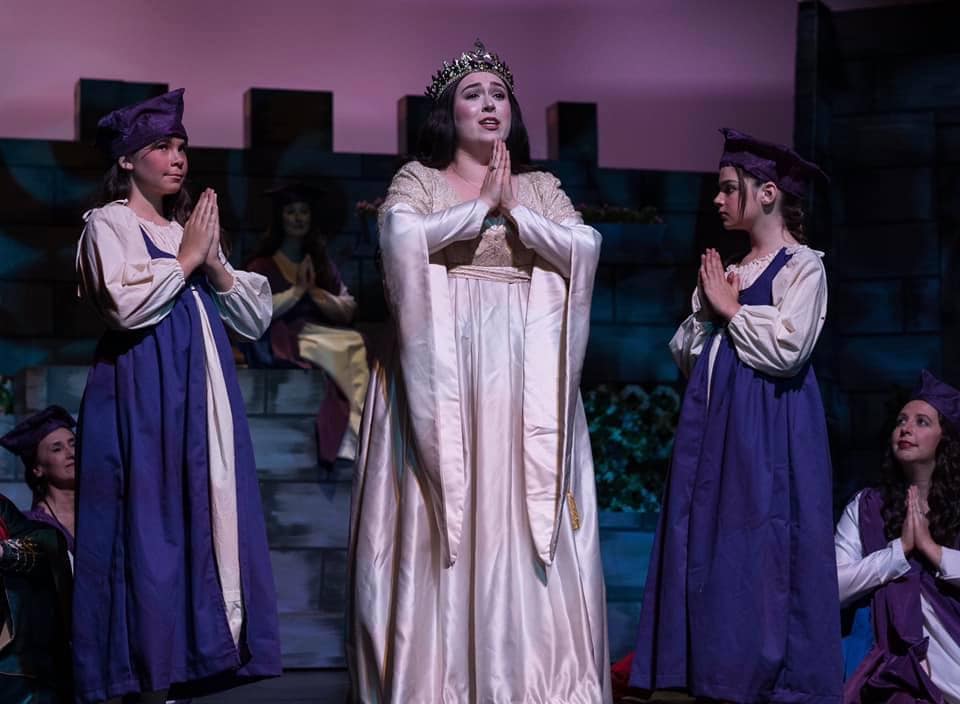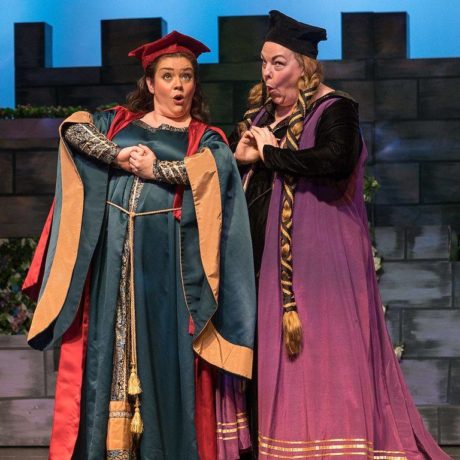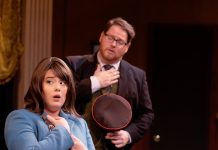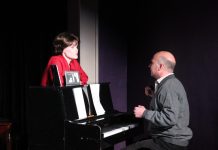Princess Ida, now being presented by The Victorian Lyric Opera Company (VLOC), is something of an odd duck in the Gilbert and Sullivan repertory. It has three acts, the dialogue is in blank verse, and the patter song role is the shortest that G&S wrote. Based on an 1847 narrative poem by Tennyson, and an adaptation of the poem that Gilbert wrote (without Sullivan) in 1870, the 1884 show’s main satirical target is the patently absurd notion of higher education for women.

This is also a show in which, with some exceptions, Sullivan’s music outshines Gilbert’s lyrics. There are some musical gems here. Soprano Erica Ferguson, in the title role, sings beautifully in “Minerva! Oh hear me” and “I built upon a rock.” She joins the trio of Hilarion, Cyril, and Florian (Billy Binion in the Saturday performance, Rick DuPuy, and Robert Gudauskas) in “The world is but a broken toy,” Ida’s lovely melancholy quartet moral equivalent to The Mikado’s “Brightly dawns our wedding day.” The large chorus and orchestra (conducted Saturday by assistant music director Amy Nicole Broadbent) provide a full, rich sound for the proceedings.
Ida is very much an ensemble show, with two male trios – Hilarion’s group and three “not intelligent” soldiers, Arac, Guron, and Scynthius (Michael Beder, Joshua Milton, and Timothy Ziese) – having much of the fun. The latter score with “We are warriors three” and “This helmet, I suppose,” the latter a delightful spoof on a Handelian aria as the troops divest themselves of annoying pieces of armor. The Hilarion group frolics at the expense of the supposed pretensions of educated women in “Gently, gently,” (“They would like to send a wire to the moon…and set the Thames on fire very soon”) and flounce about the stage in academic robe drag during “I am a maiden.” The disguise doesn’t succeed for long because the three of them are, well, such guys (“Merrily ring the luncheon bell”).
There are a couple kings in the mix as well, the misanthropic patter song character Gama (John Barclay Burns) and the huffy Hildebrand (Blair Eig), who “most politely” threatens to hang his political rivals. Gama has two brief, but effective, numbers, “If you give me your attention” and “Whene’er I spoke,” in which he describes, respectively, his philanthropic endeavors (“I know everybody’s income and what everybody earns, and I carefully compare it with the income tax returns”), and his frustration at being treated so well that he has nothing to grumble at. Burns acted the acerbic wit of the character well, though he was hard to hear at times.
Amongst the ladies (and, given the period, we are clearly talking about “ladies”), Jenellen Fischer, an accomplished physical actor with a commanding contralto voice, stood out as Lady Blanche, the ambitious and grammar-focused (“Come mighty must”) second-in-command of Ida’s women’s university. Madeleine Koon, as Lady Psyche, has fun with Darwin in “A Lady fair of lineage high,” during which Hilarion, Cyril, and Florian illustrate various steps in the incomplete evolution of men to from apes to fully human creatures. Blanche’s daughter, the readily-smitten Melissa (Amanda Jones), manipulates her mother’s ambition in “Now wouldn’t you like to rule the roast.”
VLOC’s production is a very traditional one. Denise Young’s colorful Renaissance-style costumes and a representational castle set, designed by William Pressley, would not have seemed out of place in a mid-20th century D’Oyly Carte production. Director Helen Aberger’s staging, with the chorus mostly singing in place while the leads moved somewhat more freely in front of them, was equally traditional.

In her director’s note, Aberger makes a valiant effort to argue that the production is “not about men versus women” and that the show is about traditions and norms being questioned, as things evolve toward a new tradition of listening, compromise, and respect. In making this case, Aberger runs into the heavy weather of the libretto, which is thoroughly Victorian in its view of women’s roles. When the women seek to defend their university against Hildebrand’s soldiers, they do wielding pots and pans, and their bravado soon gives way to “Please you, do not hurt us.”
Aberger has Ida intervene to stop the two male trios from fighting for supremacy in the third act, rather than having the Hilarion group defeat the Arac group, as Gilbert’s words provide. But despite this alteration, in the end Ida yields to necessity and surrenders her dream of women’s power and independence. In a kind of “I am ashamed that women are so simple” moment, she accedes to a traditional wifely role.
Controversy in England over women’s higher education, lively when Tennyson wrote his poem in 1847, had already begun to go stale by 1884. Appreciating the humor that 19th-century audience members would have found in the subject, as well as the reassurance they may have felt in seeing traditional roles holding sway, takes a sizeable imaginative leap on the part of an audience today. Better simply to enjoy the melodies for their musical merit, and the silliness for the sake of silliness that marks Gilbert’s writing. These elements come across well in VLOC’s production.
Running Time: Two hours and 40 minutes, including two intermissions.
Princess Ida, presented by The Victorian Lyric Opera Company, plays through June 16, 2019, at the F. Scott Fitzgerald Theatre, 603 Edmonston Drive, Rockville, MD. For tickets, call 240-314-8690 or go online.
Christine Pash, Sacharissa; Sarah Seider, Chloe; Karen Wahl, Ada; Kathleen Alvania, Assistant Director; Matthew Bailey, Lighting Designer; Maureen Roult, Hair and Makeup Design; Carl Maryott and Jane Maryott, Properties Design.
Ensemble: Aliyah Fischer, Julia Frank, Tom Goode, Tara Hockensmith, Lillian Hoehl, Chuck Howell, Rand Huntzinger, David Jeffrey, Ralph Johnson, Gabriella Jones, Carlton Maryott, Jane Maryott, Dave Robinson, Sarah Robinson, Cheryl Stafford, Gary Sullivan, Caleb Thomas, Maria Wilson, Kent Woods.




